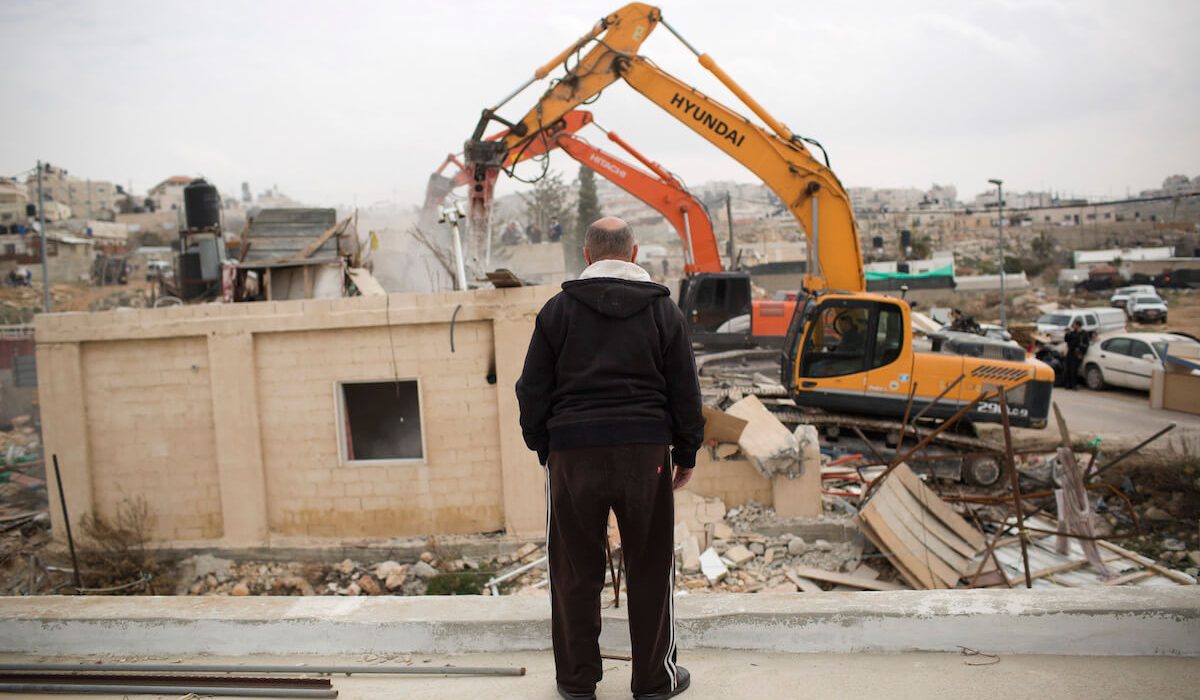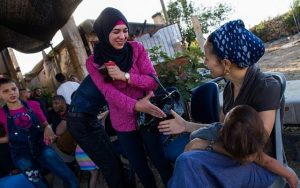- About Us
- Policy Center
- Learn
- Press Room
- Blog
- Get Involved
- Donate
- Donate to J Street Online
- Make a Gift in Someone’s Honor or Memory
- Make a Monthly Gift
- Tax-Deductible Donations
- Giving by mail

It’s an appalling thing, to demolish somebody’s home.
Demolition crews arrive, surrounded by soldiers. Families rush to save what they can. Women, children and men stand with tears in their eyes. Engines rev, walls begin to crumble, all you can do is look on helplessly.
Last week, this scene played out for two more Palestinian families in Al-Walaja, north-west of Bethlehem. 14 people lost their homes.
This year, a total of over 900 Palestinians have now lost their homes through arbitrary and discriminatory Israeli demolitions. It’s part of a broader, destructive project designed to push people from their land, make way for Israeli settlements and entrench permanent control over occupied Palestinian territory.
My fellow Israelis are sent to the frontlines to defend this. Sent to guard bulldozers, wrecking crews and arbitrary checkpoints. We are told it is essential to our security.
But the truth is that every demolition not only destroys a home holding the memories, dreams and future of a family — it also does terrible damage to our hopes for a just, peaceful and democratic future for Israel.

It’s that vision for Israel — one rooted in justice and peace and compassion — that I wanted to help build when I made aliyah when I was 23. It’s the vision for Israel that right-wing supporters of annexation, indefinite occupation and settlement expansion appear determined to extinguish in their quest for political power, territorial gain and ethno-nationalist dominance.
For many of us who live comfortably in Israel or the USA, this debate can feel somewhat abstract and academic.
But for more than 2,000 Palestinian residents in Al-Walaja, they are experiencing the very sharpest edges of the Israeli government’s decades-old military occupation every single day.
Over the years, authorities have weaponized settlements, walls, checkpoints, demolitions and zoning rules to chip away at Palestinian territory and entrench control of their land. On three sides, the town is now hemmed in by the concrete separation wall which cuts deep into Palestinian territory. Two Israeli settlements block easy access to towns and schools nearby.
One family was completely cut off from the town, having to seek permission from border guards every time they wanted to enter and leave their property. They said their home felt like a prison.
And while Palestinian families continue to have their homes demolished on one side of Al-Walaja, on the other, Israeli authorities are planning more than 1,000 units in a massive, new, unlawful settlement.
If completed, the entire town will be entirely encircled by concrete walls, barbed wire and military checkpoints.
What possible good does this do for Israel? What possible good does it do us to ignore, distract or avoid confronting the injustice of this?
It does nothing to enhance our security. It does nothing to uphold our values. It only destroys Palestinians lives, degrades our commitment to justice and puts young Israelis in harm’s way to defend an indefensible status quo.

A Palestinian woman argues with Israeli soldiers who are demolishing animal shelters on her family farm.
So how do we change the status quo?
Last week in Washington, DC — far from the West Bank — we saw a historic meeting between President Biden and Prime Minister Naftali Bennett. As the holder of both Israeli and American passports, I know the significance and importance of having neither Donald Trump nor Benjamin Netanyahu sitting in either chair.
It’s a moment that gives us the opportunity to reset the US-Israel relationship. To put it on a more sustainable, honest and productive path. And to insist on fidelity to our shared values of democracy, peace and justice as the foundation of an enduring partnership.
As Israel’s closest partner, the United States has tremendous influence over the policies pursued by the government, and the impact on the lives of everyday Palestinians and Israelis. Together, we have the capacity to make a difference.
That means pushing firmly for an end to settlement expansion. For an end to discriminatory demolitions and evictions. For an honest conversation about how to bring an end to this intolerable status quo — and for a clear red line about what US military aid can and cannot be used for in the meantime.
In Washington, in our communities and through delegations to Israel and the West Bank (in which I’ve seen more than a few members of Congress brought to tears) J Street, our allies and our movement for peace, justice and self-determination are continuing our work to transform the politics of Israel and Palestine.
We are continuing to inject insight, empathy and hope into a debate too often dominated by extremism, absolutism and indifference.
We cannot give up on the dream of a just, secure and democratic homeland for the Jewish people — not after we’ve come so far. And we cannot give up on fighting for the rights, freedoms and security of millions of Palestinians — not when so many children and families continue to suffer at the hands of policy decisions made by our governments.
We cannot let this moment pass us by.